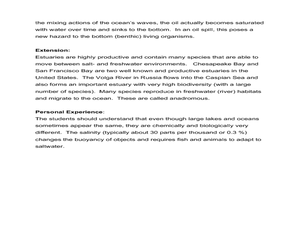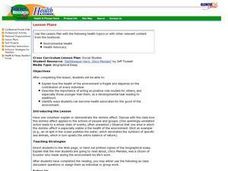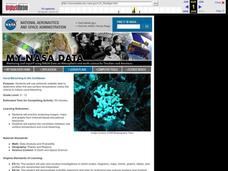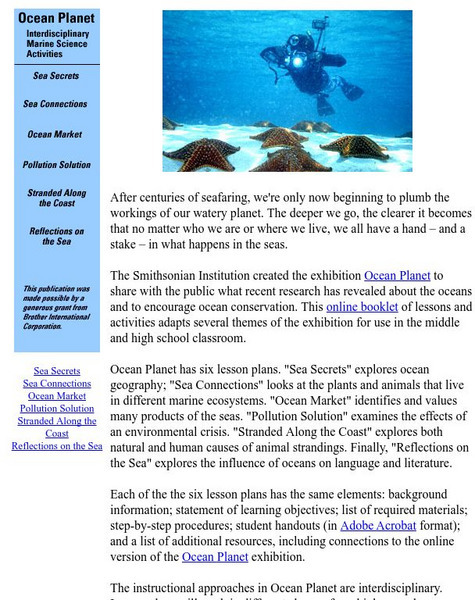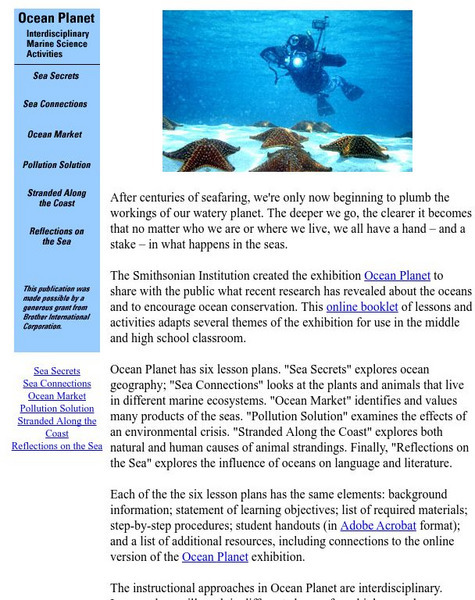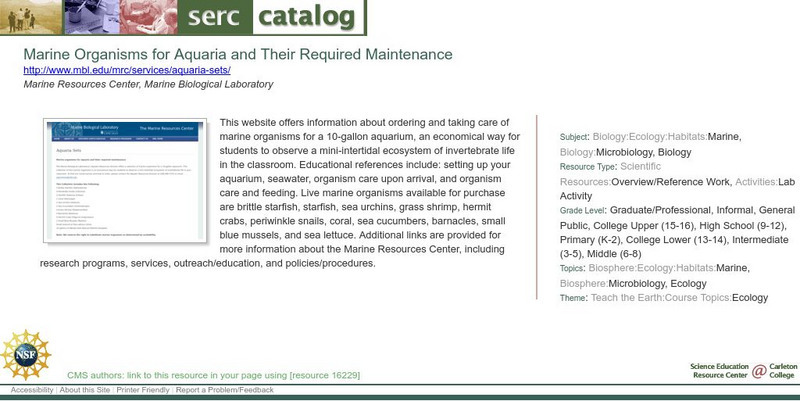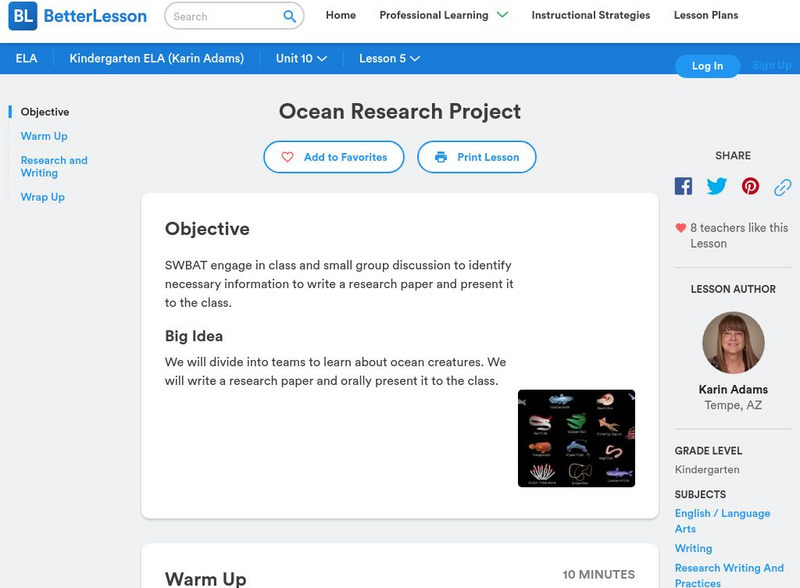Curated OER
Teacher's Guide For: Water Temperature and Salinity Experiment
Students experiment with water density, temperature and salinity. In this water instructional activity, students observe how the coldest water sinks to the bottom of a test tube, and how saltwater sinks in comparison to freshwater.
Curated OER
There Are Algae in Your House!
Learners demonstrate that, although we sometimes can neither smell nor taste them, many ingredients in our foods and household products come from the sea. They also investigate food eat to determine algae derivatives they contain.
Curated OER
Where is That Light Coming From?
Students investigate the chemistry of bioluminescence and discuss how various organisms benefit from this trait. They prepare a report about of at least one organism that receives each of the benefits discussed.
Curated OER
Fighting Conservation Crime
Young scholars identify and interpret the evolution and sources of law in Canada. Students compare and contrast the legal rights and responsibilities of individuals, groups, and organizations in Canadian society. Young scholars write a...
Curated OER
Learning About Mammals
Young scholars study the mammal classification and forms of them living in the United States. In this mammal study lesson, students read through orders of mammals that exist in the United States. Young scholars also study the taxonomy of...
Curated OER
Biographical Essay
Tenth graders explore the importance of the environment and ow fragile it is.
Curated OER
What Lies Beneath the Upper Crust?
Students discover if information in an article is accurate and current. In this science instructional activity, students read the story carefully and decide on what the subject of the article is. Students search the Internet to see...
Curated OER
Swim Like a Whale or Fish?
Students recognize the difference between whales and fish by categorizing them according to their method of swimming. They synthesize this information by simulating the swimming patterns of whales and fish and comparing it to their own.
Curated OER
Coral Bleaching in the Caribbean
Students use authentic satellite data on the NASA website to determine when the sea surface temperature meets the criteria to induce coral bleaching.
Smithsonian Institution
Smithsonian: Ocean Planet: Interdisciplinary Marine Science Activities
Smithsonian Institution presents ?Ocean Planet: Interdisciplinary Marine Science Activities?. Through this series of six interdisciplinary lessons, students will look at such things as the organisms in different marine ecosystems, the...
National Geographic
National Geographic: Human Impacts on Marine Species
Students learn about three examples of human impacts on marine life: migration patterns and shipping, algal blooms and water chemistry, and marine debris. Some of these impacts are due to human activity in the ocean, and some impacts on...
Smithsonian Institution
Smithsonian Learning Lab: Contrasts in Blue: Life on the Caribbean Coral Reef and the Rocky Coast of Maine
Smithsonian Education presents Contrasts in Blue: Life on the Caribbean Coral Reef and the Rocky Coast of Maine. Teachers can download this comprehensive teaching package in which students explore two marine ecosystems, the coral reefs...
National Geographic
National Geographic: Human Impacts on the World Ocean
For this lesson, students are introduced to the idea that humans have enormous impacts on marine ecosystems and resources, and explore the stakeholders involved.
PBS
Pbs.org: Splash & Bubbles: Marine Biology & Social Emotional Learning for Your Classroom
Through play and exploration, Splash and Bubbles demonstrates and celebrates the amazing diversity of life in the ocean, building awareness and appreciation among its young viewers. All the while, viewers are exposed to concepts of...
Smithsonian Institution
Smithsonian Education: Ocean Planet
A series of lesson plans designed to be used with the Smithsonian Ocean Planet exhibit (available online). Lesson topics include marine ecosystems, pollution of ocean water, animal strandings, and literature.
Science Education Resource Center at Carleton College
Serc: Marine Organisms for Aquaria and Their Required Maintenance
What can you do with an ocean animal aquarium in your classroom? This website offers information about ordering, setting up, and taking care of marine organisms for a 10-gallon aquarium which is a great way for students to observe a...
National Geographic
National Geographic: The World Ocean
A collection of four lessons where learners look at the vital role oceans play in our lives, at the hydrosphere and the impact humans have on it, how humans use the oceans and who is responsible for protecting them, and the rationale...
Other
Ocean Tracks: Fact or Artifact? Interpreting Patterns in Ocean Tracks Data [Pdf]
Ever wonder where marine animals go? How fast they swim? How deep they dive? Electronic tagging has opened a new window into the world of the open ocean. Ocean Tracks gives you access to data collected by tags on real live migrating...
Climate Literacy
Clean: Understanding Ocean Acidification
The following is a series of 5 activities regarding ocean acidifcation Learners will learn about rising Carbon Dioxide in the atmosphere, climate change, ocean reefs, marine calcifers and ocean pH.
Alabama Learning Exchange
Alex: Diverse Life Forms of the Ocean
This lesson allows young scholars to view and draw conclusions on the importance of life in the ocean. It uses student created movies to explore what is going on, as well as identifying the zones and diverse life associated with the...
Better Lesson
Better Lesson: Ocean Research Project
Research paper writing is a lofty goal for kindergarten students, but this lesson will expose them to the process without being overwhelming. Students will divide into teams to learn about ocean creatures and then write a research paper...
Nature Conservancy
The Nature Conservancy: Coral Reefs of Palau: Nature's Amazing Underwater Cities
This lesson takes learners on a virtual field trip to the coral reefs of Palau where they will explore amazing underwater cities found near a remote network of islands in the Pacific Ocean. Learn all about an ecosystem of symbiosis....
Science Education Resource Center at Carleton College
Serc: Inquiry Into High Resolution Ice Core and Marine Sediment Records
Activity in which questions are provided relating to interpreting paleoclimate data such as characteristics that make sites favorable for paleoclimate records, locating sites using a map, finding patterns and correlations in the data,...
PBS
Pbs Teachers: Ocean Activity Ideas
Explore ocean habitats, learn about the extreme weather of the ocean and examine environmental threats to the ocean. Conduct experiments on buoyancy and osmosis, and research sailing and ocean-based industry.


